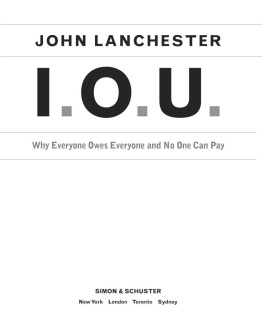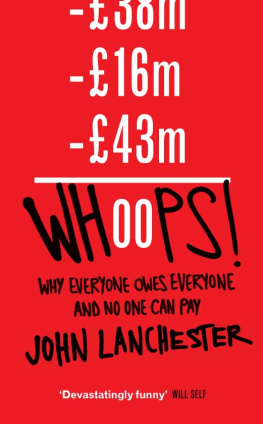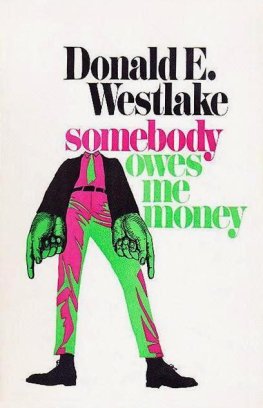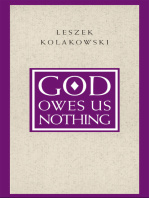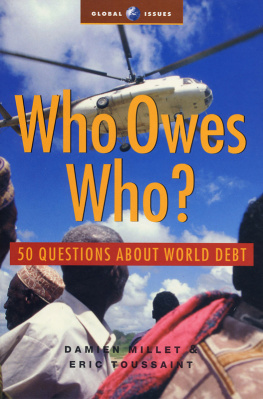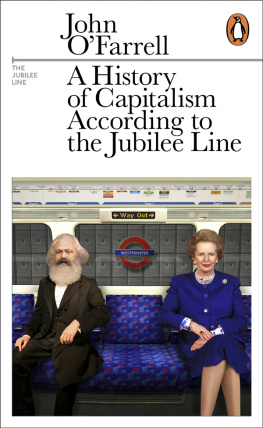John Lanchester - I.O.U.: Why Everyone Owes Everyone and No One Can Pay
Here you can read online John Lanchester - I.O.U.: Why Everyone Owes Everyone and No One Can Pay full text of the book (entire story) in english for free. Download pdf and epub, get meaning, cover and reviews about this ebook. year: 2010, publisher: Simon & Schuster, genre: Romance novel. Description of the work, (preface) as well as reviews are available. Best literature library LitArk.com created for fans of good reading and offers a wide selection of genres:
Romance novel
Science fiction
Adventure
Detective
Science
History
Home and family
Prose
Art
Politics
Computer
Non-fiction
Religion
Business
Children
Humor
Choose a favorite category and find really read worthwhile books. Enjoy immersion in the world of imagination, feel the emotions of the characters or learn something new for yourself, make an fascinating discovery.
- Book:I.O.U.: Why Everyone Owes Everyone and No One Can Pay
- Author:
- Publisher:Simon & Schuster
- Genre:
- Year:2010
- Rating:5 / 5
- Favourites:Add to favourites
- Your mark:
- 100
- 1
- 2
- 3
- 4
- 5
I.O.U.: Why Everyone Owes Everyone and No One Can Pay: summary, description and annotation
We offer to read an annotation, description, summary or preface (depends on what the author of the book "I.O.U.: Why Everyone Owes Everyone and No One Can Pay" wrote himself). If you haven't found the necessary information about the book — write in the comments, we will try to find it.
I.O.U.: Why Everyone Owes Everyone and No One Can Pay — read online for free the complete book (whole text) full work
Below is the text of the book, divided by pages. System saving the place of the last page read, allows you to conveniently read the book "I.O.U.: Why Everyone Owes Everyone and No One Can Pay" online for free, without having to search again every time where you left off. Put a bookmark, and you can go to the page where you finished reading at any time.
Font size:
Interval:
Bookmark:

ALSO BY JOHN LANCHESTER
Family Romance
Fragrant Harbour
Mr. Phillips
The Debt to Pleasure
JOHN LANCHESTER
Why Everyone Owes Everyone and No One Can Pay


Simon & Schuster
1230 Avenue of the Americas
New York, NY 10020
www.SimonandSchuster.com
Copyright 2010 by John Lanchester
All rights reserved, including the right to reproduce this book
or portions thereof in any form whatsoever. For information
address Simon & Schuster Subsidiary Rights Department,
1230 Avenue of the Americas, New York, NY 10020
First Simon & Schuster hardcover edition January 2010
SIMON & SCHUSTER and colophon are registered trademarks of Simon & Schuster, Inc.
For information about special discounts for bulk purchases,
please contact Simon & Schuster Special Sales at
1-866-506-1949 or business@simonandschuster.com
The Simon & Schuster Speakers Bureau can bring authors to
your live event. For more information or to book an event contact
the Simon & Schuster Speakers Bureau at 1-866-248-3049
or visit our website at www.simonspeakers.com .
Designed by Jaime Putorti
Manufactured in the United States of America
10 9 8 7 6 5 4 3 2 1
Library of Congress Cataloging-in-Publication Data
Lanchester, John.
I.O.U.: why everyone owes everyone and no one can pay/John Lanchester.
p. cm.
Includes bibliographical references and index.
1. Global financial crisis, 20082009. 2. Economic history21st
century. 3. International finance. I. Title.
HB3722.L35 2010
330.90511dc22 2009036465
ISBN 978-1-4391-6984-1
ISBN 978-1-4391-6987-2 (ebook)
For Miranda and Finn and Jesse
When the capital development of a country becomes the
by-product of a casino, the job is likely to be ill-done.
John Maynard Keynes,
The General Theory of Employment,
Interest, and Money
Its such a fine line between stupid and clever.
David St. Hubbins, This Is Spinal Tap


Annie Hall is a film with many great moments, and for me the best of them is the movies single scene with Annies younger brother, Duane Hall, played by Christopher Walken, the first of his long, brilliant career of cinema weirdos. Visiting the Hall family home, Alvy Singerthats Woody Allenbumps into Duane, who immediately shares a fantasy:
Sometimes when Im driving on the road at night I see two headlights coming toward me. Fast. I have this sudden impulse to turn the wheel quickly, head-on into the oncoming car. I can anticipate the explosion. The sound of shattering glass. The flames rising out of the flowing gasoline.
Its Alvys reply which makes the scene: Right. Well, I have toI have to go now, Duane, because I, Im due back on the planet Earth.
Ive never shared Duane Halls wish to turn across the road into the oncoming headlights. I have to admit, though, that I have sometimes had a not-too-distant thought. Its a thought which never hits me in town, or in traffic, or when theres anyone else in the car, but when Im on my own in the country, zooming down an empty road, with the radio on, and everything is moving free and clear, as it hardly ever is with todays traffic, but when it is, I sometimes have a fleeting thought, one Ive never acted on and hope I never will. The thought is this: what would happen if I chose this moment to put the car into reverse?
When you ask car buffs that, the first thing they do is to give you a funny look. Then they give you another funny look. Then they explain that what would happen is that the cars engine would basically explode: bits of it would burst through other bits, rods would fly through the air, the carburetor would burst into fragments, there would be incredible noise and smell and smoke, and you would swerve off the road and crash with the certainty of serious injury and the high probability of death. These explanations are sufficiently convincing that I find that the thought of putting the car into reverse flits across my mind only very temporarily, for about half a second at a time, say once every two or three years. Im sure its something Ill never do.
For the first years of the new millennium, the whole planet was zooming along, doing the equivalent of seventy on a clear road on a sunny day. Between 2000 and 2006, public discourse in the Western world was dominated by the election of George W. Bush, the attacks of 9/11, the global war on terror and the wars in Afghanistan and Iraq. But while all that was happening, something momentous was taking place, not quite unnoticed but with bizarrely little notice: the worlds wealth was almost doubling. In 2000, the total GDP of Earththe sum total of all the By the end of 2006, it was $70 trillion. In the developed world, so much attention was given to the bust in dot-com shares in 2000the greatest destruction of capital in the history of the world, as it was called at the timethat no one noticed the way the Western economies bounced back. The stock market was relatively stagnant, for reasons Ill go into later, but other sectors of the economy were booming. So was the rest of the planet. An editorial in The Economist in 1999 pointed out that the price of oil was now down to $10 a barrel, and issued a solemn warning: it might not stay there: there were reasons for thinking the price of oil might go to $5 a barrel. Ha!
By July 2008 the price of oil had risen to $147.70 a barrel, and as a result the oil-producing countries were awash with cash. From the Arab world to Russia to Venezuela, the treasury departments of all oil-producing countries resembled the scene in The Simpsons in which Monty Burns and his assistant, Smithers, pick up wads of cash and throw them at each other while shouting Money fight! The demand for oil was so avid because large sections of the developing world, especially India and China, were undergoing unprecedented levels of economic growth. Both countries suddenly had a hugely expanding, highly consuming new middle class. Chinas GDP was averaging growth of 10.8 percent a year, Indias 8.9 percent. In fifteen years, Indias middle class, using a broad definition of the term meaning the section of the population who had escaped from poverty, grew from 147 million to 264 million; That seemed utopian at the time the goals were set, but with the world $34 trillion richer, it suddenly looked as if this unprecedented target might be achieved.
And then it was as if the global economy went out one day and decided it was zooming along so well, thered never be a better moment to try that thing of putting the car into reverse. The result well, out of what seemed to most people a clear blue sky, the clearest blue sky ever, there was a colossal wreck. That left an awful lot of people wondering one simple thing: what happened?
Next pageFont size:
Interval:
Bookmark:
Similar books «I.O.U.: Why Everyone Owes Everyone and No One Can Pay»
Look at similar books to I.O.U.: Why Everyone Owes Everyone and No One Can Pay. We have selected literature similar in name and meaning in the hope of providing readers with more options to find new, interesting, not yet read works.
Discussion, reviews of the book I.O.U.: Why Everyone Owes Everyone and No One Can Pay and just readers' own opinions. Leave your comments, write what you think about the work, its meaning or the main characters. Specify what exactly you liked and what you didn't like, and why you think so.

